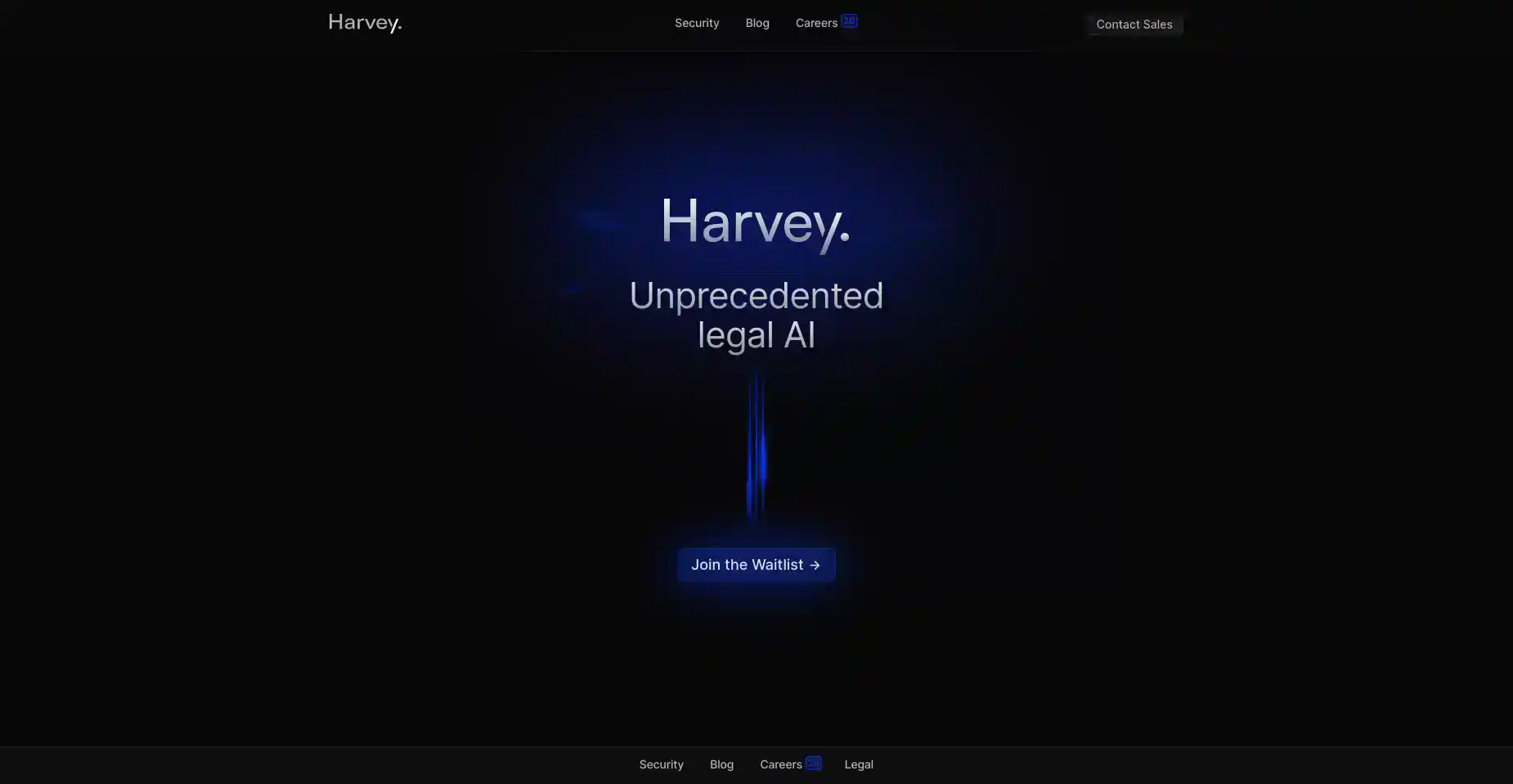Table of Contents
You might have seen more people talking about AI and how it can change different industries, especially with an important rule in place. But what does the future hold for AI in law firms?
AI for law firms makes work easier. It helps with regular jobs, making them faster. This saves time and money, especially for a car accident lawyer handling high case volumes and tight deadlines. AI does some tasks, so lawyers have more time for clients. This helps them focus better and do a better job.
What is Harvey AI?
Similar to ChatGPT, Harvey AI is based on OpenAI’s GPT AI but is tailored for legal tasks. It learns from general internet and legal data, including case law. When used by a law firm, it undergoes specific training with the firm’s work products, akin to onboarding a new employee. Effective prompts play a crucial role in enhancing the performance of this generative AI designed for law firms.

What is Harvey AI used for?
Harvey AI supports law firms by analyzing contracts, checking details, handling legal matters, and ensuring compliance with rules. It provides helpful insights and predictions from data, helping lawyers offer quicker and more affordable solutions to clients’ problems. It’s the go-to AI for law firms.
4 Ways Harvey AI Helps Law Firms
Harvey AI, a new software in progress, will help law firms work better. This tech is a big deal for the legal industry, bringing a lot of excitement. It can handle different legal tasks. Let’s see how AI for law firms like Harvey AI can help!
- Legal research can be transformed: Harvey AI is particularly skilled in legal research. In the past, legal experts had to spend a lot of time going through extensive amounts of case law, statutes, and legal documents. However, with Harvey AI, this task is now quicker, more precise, and extremely efficient. This AI system reads legal stuff super fast. It finds important details in cases and laws, saving lawyers tons of time. Harvey AI helps lawyers get quick and complete legal info. So, they can give better advice to clients, and make smarter choices.
- Enhance the productivity of your law firm: Analyzing contracts is important for law firms, but it takes a lot of time and mistakes can happen. Harvey AI changes this by using AI to look at contracts. It finds important parts and checks for mistakes. This helps work faster and makes sure nothing important gets missed. Harvey AI helps lawyers by giving summaries of contracts, showing problems, and pointing out things they need to check more.
- Improve client satisfaction: In the law business, giving clients special and quick help is important. Harvey AI helps a lot with this by helping legal experts serve their clients better. With Harvey AI doing regular jobs automatically, lawyers get more time to connect with their clients. Harvey AI manages tasks like documents and schedules, so lawyers can concentrate on giving great legal advice and personal help. This makes clients happy and helps law firms work better overall.
- Minimize expenses at the law firm: AI technology has the potential to greatly cut down on expenses related to legal operations by automating tasks that require a lot of manual work. Law firms can enjoy the advantages of more efficient processes, improved productivity, and lower overhead costs. By using Harvey’s AI-powered platform, legal professionals can make the most of their time, allocate resources more efficiently, and ultimately provide greater value to their clients. This cost-effectiveness is a major reason why AI solutions are becoming increasingly popular in the legal industry.

Harvey AI partnering with Major Law Firms
In February 2023, Harvey AI partnered with Allen & Overy, one of the world’s largest law firms. Since November 2022, more than 3,500 lawyers from the London-based firm have tested Harvey AI by asking 40,000 questions in their daily tasks.
David Wakeling, the head of Allen & Overy’s Markets Innovation Group, expressed his optimism about the results. He mentioned that Harvey, a remarkable tool, can operate in various languages and practice areas, providing exceptional efficiency and intelligence. During their trial, they witnessed some remarkable outcomes.
Allen & Overy teamed up with Harvey, the first law firm to do so. But they’re not alone. Harvey AI is helping other law firms too, making special tools. On March 15, 2023, PwC joined hands with Harvey AI in a big partnership, showing how AI for law firms is becoming more widespread.
Law Firms that are using Harvey AI
Macfarlanes is the newest law firm to use Harvey AI, an advanced artificial intelligence tool like Chat-GPT. They’ve launched it widely after testing it in the summer with over 70 lawyers. Allen & Overy led this trend by adopting Harvey in February, followed by others like PwC. Reed Smith, Addleshaw Goddard, Osborne Clarke, and Ashurst are interested in trying this AI for law firms. This AI helps lawyers by generating insights and supporting their work. Macfarlanes’ move reflects a growing trend among law firms, embracing technology like Harvey AI to enhance their services and efficiency.
The Role of AI for Law Firms
Different-sized law firms must use AI for efficiency and value. Smaller firms and solo attorneys can tackle new cases with innovative AI use. Meanwhile, larger firms face client expectations for AI utilization, demanding process and pricing adaptations to show its value. Overall, the impact of AI on law firms varies by size, influencing their ability to handle cases, meet client expectations, and adjust pricing strategies accordingly. AI allows smaller firms to expand their scope, while larger ones must integrate it effectively to meet client demands and demonstrate its value in their services and pricing structures.Additionally, implementing effective SEO for lawyers can significantly enhance a firm’s online presence, attracting more clients and showcasing their expertise in leveraging AI and other modern technologies.
- Solo lawyers utilize generative AI to grow: Generative AI is a valuable tool for solo attorneys who want to expand their practice. Solo attorneys who charge by the hour face limitations in growth due to the limited number of hours in a day. Even those who charge by the case are restricted by their capacity to complete the work within a reasonable timeframe. By utilizing AI-powered legal research and expertise from a reliable source, you can save a significant amount of time in both transactional and litigation matters. When you spend less time researching and working, you might have more time for client calls or meetings. Using AI for law firms can help you finish work faster, so you can offer better prices or spend time on what matters most to you, like family or personal growth. With AI doing tasks like research, you’ll have more free time for yourself.
- Small law firms can innovate by utilizing generative AI: Small law firms with up to 10 attorneys can also save time like solo practitioners. By utilizing AI-powered legal software tools, they can handle more cases efficiently and explore new practice areas effortlessly. Embracing generative AI early on can make these small firms appear innovative and forward-thinking. Instead of waiting for the market to determine the applications of generative AI, early adopters have the opportunity to experiment based on their firm’s needs or the interests of their attorneys.
- Generative AI is helping mid-size law firms to elevate their competition to a whole new level: Zach Warren (Lead Technology and Innovation Content for the Thomson Reuters Institute) believes AI, like ChatGPT and Copilot, helps small and midsize firms compete with bigger ones. These tools act like superpowers, especially for smaller firms that don’t have many staff. Partners, who think strategically, see the value in using AI in legal work. They know these tools can save costs and help the firm grow. For lawyers aiming to stand out in their firm, guiding the firm in using AI could boost their careers.
- Large law firms utilize generative AI to meet the requirements of their clients: Warren believes that Generative AI is changing the way global large law firms operate. This could lead to increased pressure from clients for flat-rate pricing. It could also result in corporate clients choosing to handle more legal matters internally. Clients want big firms to utilize technology, but they don’t want to pay for services they can do themselves. This is a specific concern for global large law firms, as their clients are typically large corporations with legal teams who want to closely manage costs. According to the Association of Corporate Counsel (ACC), almost 60% of corporate legal departments have dedicated tech and operations staff. They are automating their processes and expect their law firms to do the same.
Challenges that Harvey AI faces
Using AI in law firms brings up challenges and ethics. We need to tackle these issues for fair and responsible use of tools like Harvey AI.
One big worry is if AI can be unfair. The team behind Harvey is fixing this by using different data to train it, so it’s fairer. Lawyers need to be careful and smart when they use AI results.
To reduce bias and discrimination in AI used by law firms, the following approaches can be adopted:
- Varied and inclusive training data: For AI to be fair, it needs different kinds of information to learn from. This means picking varied data and always checking for any unfairness that might show up, especially when it’s used for law firms.
- Algorithmic auditing and bias testing identify and address potential biases in algorithms.
- Continuous monitoring and enhancement: Monitoring AI systems is crucial to check for biases and unfairness. Giving feedback and updating regularly can make AI algorithms fairer and more accurate. This is essential for AI used in law firms.
- Collaboration and training initiatives: Law firms can work together with AI to help lawyers. They can also teach them about AI through training programs to improve their skills in AI for law firms.
With the latest progress in artificial intelligence, Harvey AI has ample time to address and overcome these challenges. Now, it’s a matter of waiting to see how well the software works in the legal industry, especially for law firms. As AI tools like Harvey revolutionize legal workflows, law firms are also turning to digital strategies to grow their client base. Partnering with a law firm PPC agency can help firms generate qualified leads through targeted ad campaigns, ensuring their tech-driven services reach the right audience online.
Conclusion
Harvey AI revolutionizes the legal sector by simplifying procedures, boosting productivity, and enhancing customer support. Its cutting-edge features in legal investigation, contract examination, and client administration offer great benefits to legal experts.
But it’s important to find a balance between the advantages of AI and the ethical concerns tied to its use. As Harvey AI advances, it can change how legal services work, making them more efficient and available for law firms.
The legal world is buzzing with excitement! People think this new software will change how law firms work. We hope Harvey AI lives up to expectations and becomes a trusted ally in every law firm’s tech tools. AI for law firms holds the promise of big changes, and many believe it’ll transform how things are done. If Harvey AI does what everyone hopes, it could become a go-to helper for law firms everywhere, revolutionizing how they use technology.
You may also like: How to Use Grok AI: A Step-by-Step Guide to Access Grok